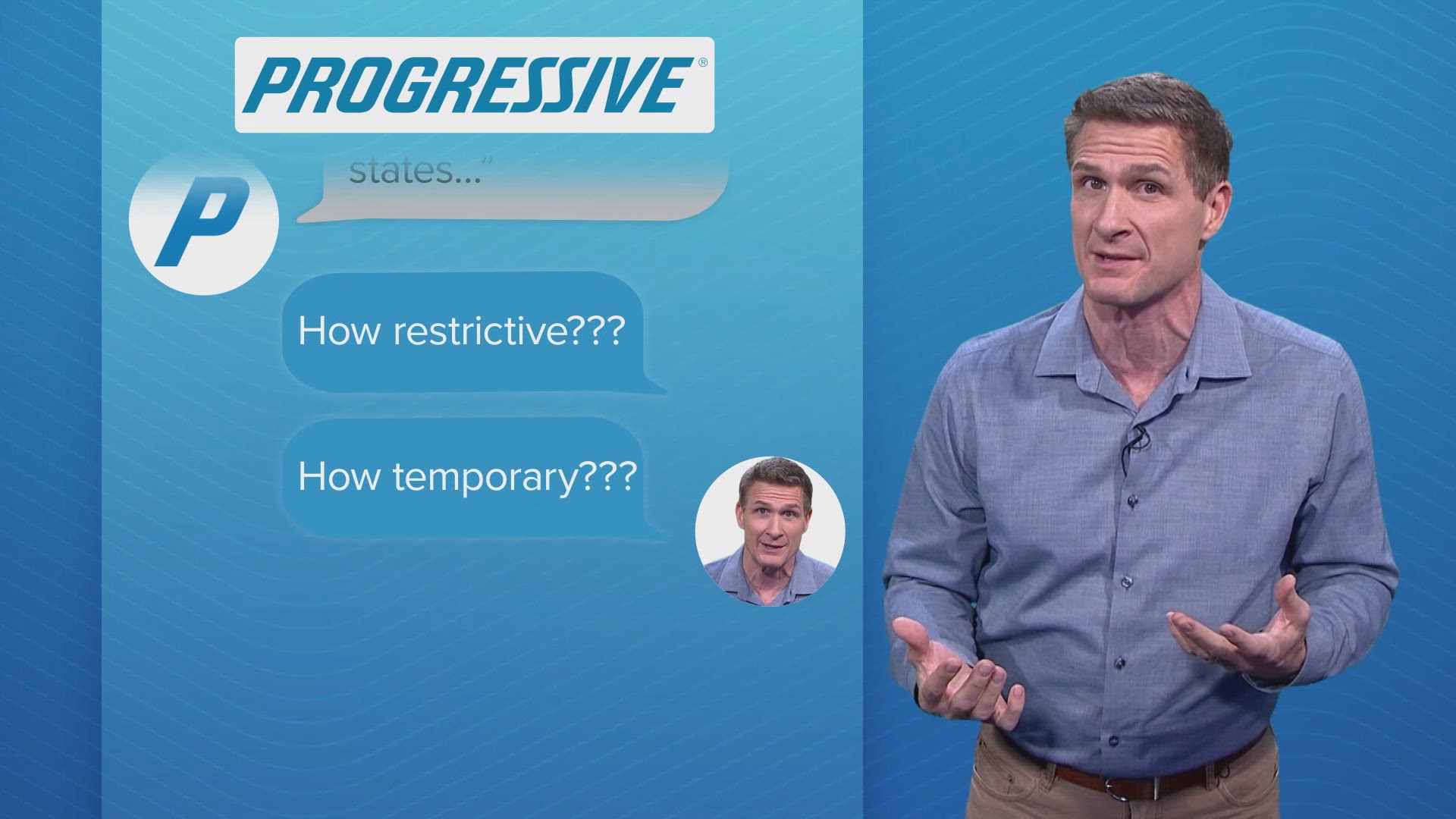DALLAS — First came the rumors, and then came a report (without definitive, direct confirmation) that Progressive Insurance was no longer writing new homeowner’s policies in Texas.
If true, that would be big news.
So, I did some digging and repeatedly asked Progressive about it. I specifically sought information about whether they were no longer writing new homeowner’s insurance policies in Texas and whether current homeowners policies in Texas wouldn’t be renewed when they expire.
After initial silence, I got an answer. Well… a partial answer.
Progressive responded: “We are temporarily restricting new homeowners (HO3) business for certain agents in several states. We remain committed to the property business in these states and expect that these actions will better position us to build a stronger, more stable, and more competitive Progressive Home business for consumers and independent agents in the long run. These actions will not impact any other lines of business in the affected states; impacted agents can continue to write Personal Auto, Recreational Lines, and Commercial Lines products. Additionally, property-appointed agents can continue to offer Renters, Condo, Flood, and Umbrella.”
Just to be extra sure, I asked them whether Texas is one of those “several states” they referred to. Progressive confirmed that, yes, “Texas is one of the states in which we are temporarily restricting new homeowners business (HO3) for certain agents”.
Now that we have that out of the way, let’s discuss some of what we still don’t know.
It is unclear how "temporary" this is, or exactly how "restrictive" this is. I have asked whether Progressive is writing any new homeowners policies in Texas, but I have not heard back.
Progressive also has not answered my question about whether any of this will affect potential future renewals of homeowners policies it already has in effect in Texas.
The part of their response where Progressive maintained that this doesn't affect their other lines of insurance in Texas is significant, because according to Texas Department of Insurance (TDI) documentation, Progressive was this state’s largest private passenger auto insurer in 2023, accounting for 18.49% of the market here. By contrast, the company handled 2.52% of homeowners multiple peril policies in Texas last year.
That may not sound like a lot, but that made Progressive the 8th largest home insurer in Texas in 2023.
Insurance profits and losses
Importantly, if you look at the eight largest home insurers in Texas, Progressive made a net underwriting profit of $101,694,659 from its homeowners policies last year. The state’s largest home insurer, State Farm, did well, too: $128,191,092. But the six other large insurers between State Farm and Progressive all lost between $15 million and $459 million last year on their home policy business in Texas. So, you have to wonder how those other large insurers are doing – and specifically, how they feel about the risks of doing business in this state.
Many insurers have been raising our homeowner premiums, which, as I reported earlier this year, went up more than in any other state last year and for the last five years, according to data analysis by S&P Global Market Intelligence. But even that extra revenue from increased homeowners premiums hasn’t been enough.
Remember also that, in that same report, I revealed that some customers who had homeowners coverage through Farmers Insurance (the fourth largest home insurer in Texas in 2023) were getting a “Home Insurance Notice of Non-Renewal” letting them know their homeowners policies wouldn’t be renewed unless they added an auto policy with Farmers as well. At the time, Farmers explained to me that because of the “frequency of catastrophe events, increased reconstruction costs and persistent inflationary pressures, we initiated targeted underwriting actions to better manage our risk exposure in the state”.
Back to the 2023 report from TDI: If you scroll down the profit and loss column to the bottom line that includes the total amount of money made or lost by home insurers in Texas in 2023, you can see they had a combined loss on homeowners policies of $686,178,696. And 2024 so far has also been a bad year for severe weather in Texas – and, consequently, for insurance companies here.
How bad it has been is summarized in just three crucial sentences in a 93-page SEC filing by Progressive just before it pulled back on new homeowners policies in Texas – words that, in light of the previous risk exposure comments by Farmers Insurance, are not comforting if you live in Texas and need affordable homeowners insurance.
Rising insurance risks in Texas
First, Progressive explained that they are working to reduce their “exposure to coastal and hail prone states for our homeowners products.” That's obviously not good given that we have a lot of coastline in Texas. And then there's the fact that, as I also reported this past spring, Texas was the runaway winner — or loser in this case — for the number of major hail events last year, with more than a thousand of them.
Second, Progressive noted that, in the second quarter of this year, they dealt with a number of “severe weather events throughout the United States” and that Florida, Colorado, Missouri, and Nebraska combined accounted for about 30% of their catastrophic losses.
Finally, in the third sentence – really more of a clause for the second sentence than anything else – Progressive added it could credit "nearly 40% of [its] storm losses in Texas" alone.
Oof.
All of which is to say this: Keep an eye on your premiums, folks. Because at this point, it's clear that insurers are paying close attention to increased risks in Texas. And even if just one big insurer is pulling back from writing new homeowners policies – however temporarily – that doesn't exactly bode well for any affordability offered elsewhere.
More Right on the Money content:

